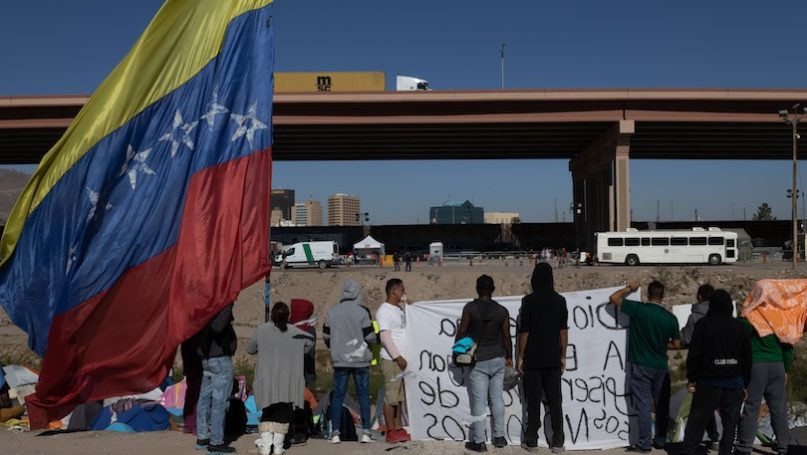
This case study is an excerpt from McGlinchey, Stephen. 2022. Foundations of International Relations (London: Bloomsbury).
Venezuela’s economy gradually collapsed between 2010–2015. As a major oil producer, the falling price of oil in 2015 hit an economy already beset with political repression, human rights abuses and the endemic corruption of the Chavez and Maduro regimes. Hyperinflation and economic mismanagement made food and medicine unavailable, or unaffordable, to most people. This has resulted in large-scale protests and the collapse of social order to the extent that the state has functionally failed. Approximately five million people have left Venezuela through different channels as a result of the aforementioned issues. This is all the more disturbing as, in the past, Venezuela actually hosted large numbers of refugees due to its location and former prosperity. Therefore, as a case study it illustrates how migration within the region is shaped by contextual and shifting dynamics.
Those who were the first to leave Venezuela were those who had the means to choose their place of resettlement. This was either due to accumulated wealth, by their professional skills that gave them to opportunities work abroad, or by a combination of these factors. Others with less ability to plan ahead later fled to the nearest borders to seek safety in neighbouring states, such as Colombia. The extent of the numbers moving led Freier and Parent (2019) to describe it as an ‘exodus’ – second only in scale in modern times to the mass displacement caused by the Syrian Civil War. While Colombia has the longest land border with Venezuela and thus provides the easiest access for Venezuelans on the move, it also served as a transit state for those who wished to continue their journeys southwards.
The plight of Venezuelans and the questions over how to best offer a regional response to this displacement crisis have been addressed in the Quito Process, a multilateral regional forum. As part of this initiative, in 2018 representatives of 11 states from Central and South America signed a declaration to provide a collective response. The outcome of this was the continuation by individual states to provide Venezuelans specific channels to regularise their stay as well as apply for family reunion measures in order to provide family members safe access to the receiving state. However, despite this affirmed collective will, the signatory countries later began to restrict the entry of newly arriving Venezuelans. In August 2019 Ecuador, for example, began to require a specific humanitarian visa from incoming Venezuelans, despite the practical difficulty of applying for such a document and this being in breach of international human rights obligations.
The crisis in Venezuela has also pushed different categories of migrants to reverse their migratory trajectories. For example, a large group of people who have left Venezuela during the crisis consists of Colombians who had moved to Venezuela to seek work. This underlines the dramatic reversal of Venezuela’s situation as a state that once attracted economic migrants and offered safety from longstanding conflicts in Colombia that had raged between the Colombian government and criminal drug cartels and terrorist groups for decades. Yet, with the situation reversing and a spiralling crisis unfolding in Venezuela, many people understandably reversed tracks.
In Chile, a reverse movement of a different kind was also seen, once again partly related to shifting dynamics of regional security. Chile introduced a process in 2018 to facilitate access to a residence permit for Venezuelans. The process, however, was slow and did not an initial right to work as people waited for their permit. This meant that many sought work on the black market which comes without access to social rights connected to the regular labour market status. That led to some calculating that leaving Chile would be a better solution. Added to this, widespread political protests within Chile broke out in 2019. While Chile is undoubtedly much safer than Venezuela, those with pending residence permits faced being stuck in a slow-moving bureaucratic process with uncertainty over how the political context might evolve – especially as Chilean society faces its own problems and shifting priorities.
When adding the Covid-19 pandemic to this situation post 2020, making decisions became ever more difficult for each individual – and this uncertainty resulted in some going back to Venezuela. This serves as an example of how a simple model of push and pull factors determining human mobility is limited in its capacity of explaining why some move, others stay, and yet others decide to return even if the conditions pushing to leave their home in the first place have not changed.
Overall, the crisis in Venezuela shows how large-scale population movements change destinations depending on global and societal contexts at a given time, how mobilities are multiple and dynamic from a sending state to a receiving one, and how the regional reception dynamics change when the crisis prolongs over many years. In such a scenario, neighbouring states need to make policies that reach towards longer term settlement and integration which is not an easy task especially when these states may also undergo societal upheavals of their own (as with Chile) that pose additional challenges to policymaking. Long term, the only real solution to such a crisis – and this is true in any similar case – is the re-establishment of good governance within Venezuela itself.